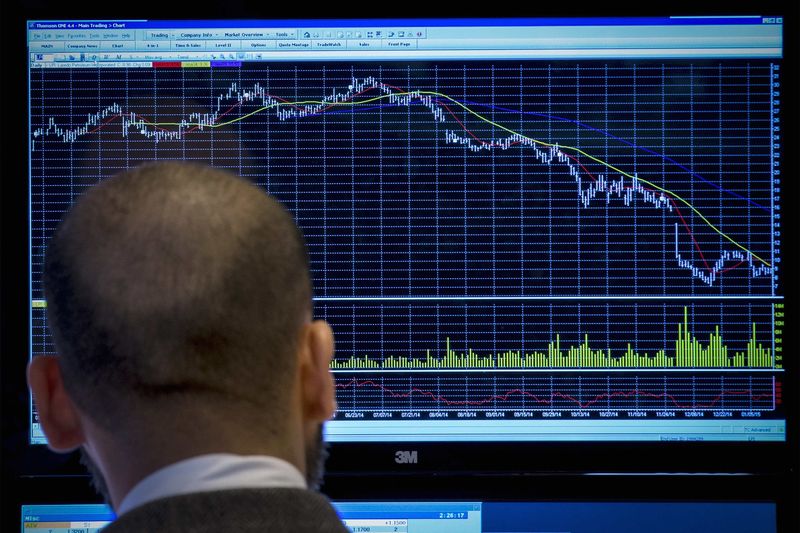© Reuters. FILE PHOTO: A worker climbs on a ladder under the logo of Swiss bank UBS at the company’s headquarters in Zurich May 26, 2011.REUTERS/Arnd Wiegmann/File Photo
By Oliver Hirt
ZURICH (Reuters) – UBS’s emergency takeover of Credit Suisse may lead to thousands of job losses, departures of key staff and a risky integration challenge, but for many UBS investors it increasingly looks like a good deal for Switzerland’s biggest bank.
Since UBS bought Credit Suisse in a 3 billion Swiss franc ($3.4 billion) deal completed last month, investors have come to share the optimism of UBS Chairman Colm Kelleher, who has highlighted the many opportunities as well as potential pitfalls arising from the takeover.
Several fund managers who hold UBS stock have told Reuters they think UBS has bought Credit Suisse at a good price, with some even describing it as a steal.
“I think UBS is being rather conservative about the true extent of the benefits it can get from this politically sensitive merger,” Guy de Blonay at Jupiter Asset Management said.
UBS agreed to take over CS in a rescue orchestrated by Swiss authorities as Switzerland’s second-largest teetered bank on the edge of collapse, creating a combined group overseeing more than $5 trillion of assets.
UBS has said the integration of the two organisations could take three to four years, during which time it plans to manage two separate parent companies – UBS AG and Credit Suisse AG – each with its own subsidiaries and branches.
Ultimately the deal promises to give UBS a leading position in key markets it would otherwise have needed years to grow in size and reach.
“UBS got Credit Suisse for practically nothing, so accordingly the deal will work out for them,” another investor told Reuters.
STATE GUARANTEE
In a regulatory filing in May, UBS flagged tens of billions of dollars in potential costs and benefits from the takeover.
It said it expected a negative impact of $13 billion from fair value adjustments of the combined group’s financial assets and liabilities, and a further $4 billion in potential litigation and regulatory costs stemming from outflows.
However these items would be more than offset by a 16 billion franc gain from the writedown of Credit Suisse’s AT1 bonds, as well as $34.8 billion from buying Credit Suisse at a fraction of its book value.
It also received a state guarantee to absorb up to 9 billion francs in losses. As a result UBS has gained a huge risk buffer to help digest its cross-town rival.
“They wouldn’t have got this buffer in a normal merger,” said Andreas Thomae from Deka Investment.
Fund managers also raised doubts that competition watchdogs would have approved such a deal – which gives the combined bank a market share of more than a quarter of both Swiss domestic loans (26%)and domestic deposits (26%) – under normal circumstances.
“Now the authorities have waved the deal through because they had to find someone in an emergency situation,” Thomae added. “It’s an attractive deal for UBS if it goes through as planned.”
Still, UBS inherits a troubled legacy at Credit Suisse, said Thomae, pointing to legal risks which UBS has said could cost billions of dollars.
Another manager said the biggest risk for UBS is that many of Credit Suisse’s best client advisers in the millionaire and billionaire business will leave.
Rivals have poached entire teams from Credit Suisse, he said, and some clients are likely to follow them.
In a worst-case scenario, up to half of the assets Credit Suisse oversaw before big withdrawals began last October could eventually leave the bank for other wealth managers.
The fund manager expects a bumpy two years for UBS, but in the longer term, he too is more positive. “Over a three- to five-year period, though, the acquisition probably does pay off,” he said.
CASH COW
Jupiter fund manager de Blonay was even more confident. “UBS is in a good position to restructure quickly, limit outflows and reduce risks,” he said, adding that in the longer term, earnings should pick up, helping the company achieve a much higher valuation.
“Therefore, I believe UBS looks attractive at current levels.”
UBS shares have gained 5.1% since the deal was first announced, slightly underperforming the STOXX Europe 600 Financial Services Index.
De Blonay said the share moves probably reflected market uncertainties surrounding the takover, but he expected a positive development in the share price “when the dust settles”.
Analysts at JP Morgan expect a big jump in UBS stock as the positives from the takeover become apparent. The bank has set a price target of 27 Swiss franc by the end of 2024, up from the current level of 18.22 francs.
Analyst Kian Abouhossein sees UBS as a wealth management powerhouse that could attract 150 billion dollars in new client money annually.
That would equate to a volume every three years equal to the total assets under management at Julius Baer, which has taken Credit Suisse’s place as Switzerland’s second-biggest wealth manager.
Still, one big unanswered question remains is the fate of Credit Suisse’s Swiss business.
Although the Swiss public and politicians favour a spin-off to increase choice and competition, one insider expects it to be integrated into UBS.
Investors also welcomed such a move for the business, Credit Suisse’s best performer last year when it posted a pretax profit of 1.4 billion francs.
Deka’s Thomae said UBS and Credit Suisse together would have a market share in Switzerland that is just within acceptable limits. “From UBS’s point of view, the business is a great asset, a good cash cow,” he said.
($1 = 0.8592 Swiss francs)
Read the full article here




